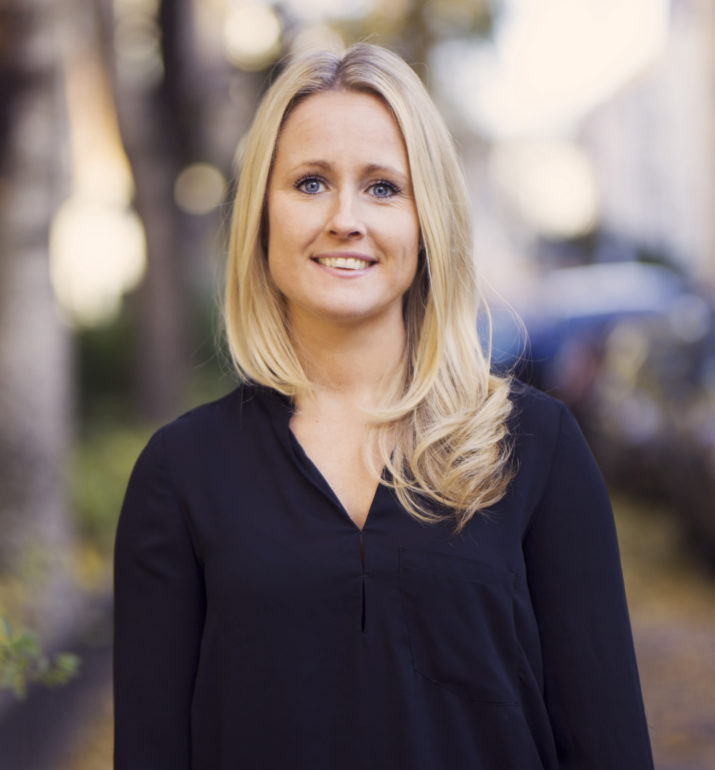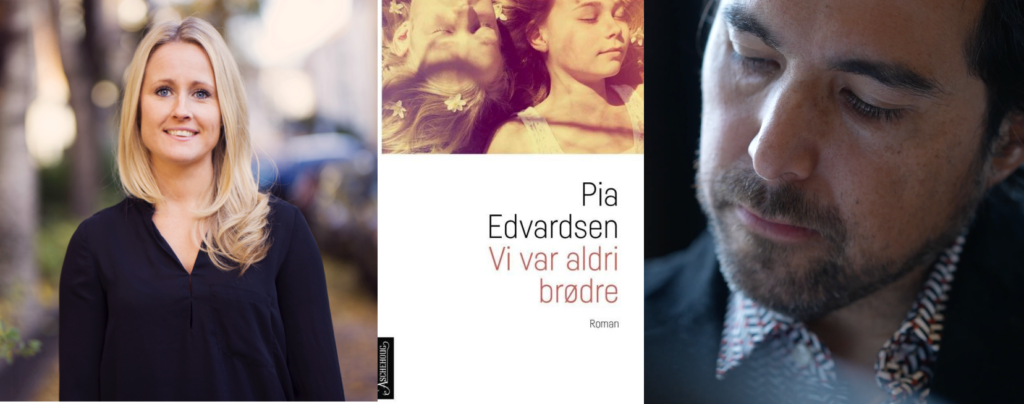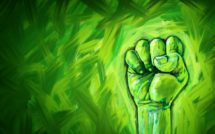

Translated from the Norwegian by Mauricio Ruiz.
A Summer Like Any Other
I sit alone at the airport in northern Norway to see my paternal grandmother before she dies. The bus rides on the new road, no one drives on the old road anymore. Just my dad. He will always drive on the old road, because that’s where his father used to drive.
After driving over the bridge, the bus turns down towards the fjord. There’s more and more space between each house, and down on the shore there are only a couple of boathouses, most of them are no longer in use. Far away, someone burns a fire, perhaps from old car tires, because the smoke is completely black, it rises higher up to the sky and eventually disappears. I have my forehead facing the bus route and see the smoke disappear in the clear summer air. Only when the bus makes a turn do I see our summer house, Grandma’s house. It is located in the narrow part of the fjord. The bus runs slowly enough so that I have time to see the house, the shed, the spruce and the islet just as a dot out on the fjord. I also see Einar’s dog, running between the rocks in the shoreline. Einar is Grandma’s neighbor, and has lived here forever. He is now eighty-four years old, but he still believes he can manage on his own. He’s used to being alone.
The bus drives past the road down to our house. In just that turn, we once hit a hare. My father was driving, while my sister and I sat in the back seat. He braked abruptly, but still hit it, and the hare screamed like a child. That was what father said when he told Einar afterwards that the hare had screamed like a young one. My father got out of the car, picked up the shotgun in the trunk and stood in the middle of the road. What if another car comes, I wanted to say, but knew that he was just going to ask me to shut up, say that there would be no other cars, people don’t live here anymore. He stood with the shotgun in his hand and asked me to make my sister look away. I put my hand over her face. She sat completely still, so I did not have to hold hard, but I did so nonetheless. Dad opened the barrel, saw that there were no more cartridges left, then turned the shotgun over and hit the hare with the butt. Twice. It stopped screaming after the first blow. I took my hand away from my sister’s face, and she rubbed her eyes with her sweater.
“Is it dead now?” she asked.
“Yes,” I replied, “it is dead.”
Dad got back in the car and turned to me and my sister.
“Animals must not suffer,” he said.
It sounded like a law that my sister and I should remember forever.
Now it’s me who’s traveled up here while my sister’s at home. My dad has been here for several days already. As the bus approaches the city, goats are no longer spotted everywhere, and houses stand closer to each other. The clouds have become darker, and there’s a chance it will rain soon. But if it does, it’s just a summer rain. Tomorrow it will continue to be bright. It is still a long time until the autumn darkness settles everywhere in the north; over the house, the spruce, the boathouse and the shed, over the fjord. I’ve never been here in the winter.
When I get off the bus, my father is waiting for me. It’s been over three weeks since I saw him, when we met for a coffee close to where he works. It has neither been long nor short since we saw each other. This is the time it takes between each time one sees one’s father when one is an adult.
“Hey,” he says, “so nice of you to come.”
He squeezes my shoulder lightly before taking my bag. I spot a small purple thread in his hair and feel like taking it off, but I do not.
“Did the trip go well?” he asks.
“Yes,” I reply, “it went well.”
Dad nods and gray streaks form on his cheek. Next month he will be sixty-two years old. He was thirty-three when he had me.
With my bag over his shoulder, he walks towards the nursing home, before stopping and turning towards me again.
“You have to steel yourself,” he says, but at the same time appears so controlled that I can not answer anything, I just nod. My father runs a hand through his hair, and the purple thread disappears between his fingers.
The room we enter is similar to any other room in such a place. We could be anywhere. It does not help that father has brought several of grandmother’s things here. He did that several years ago, put in a chest of drawers, two brown leather chairs, sofa cushions that Grandma herself has crocheted covers for, and a coffee table with a glass top. He did so that the room ressembles a home, but all those things makes the place look even less so.
Grandma is lying in a bed by the window, with her eyes shut and the curtain drawn. It’s been over a year since I saw her. Dad and I stand next to her bed, and she reaches with one hand, as if she were trying to get a hold of something. Dad puts his hand on her head, strokes the back of his hand against her cheek, and she barely opens her eyes. They are no longer blue, but a color I do not know the name of. As if someone had taken away the color they actually were. My father moves a little to the side, so that I can stand right next to him. I put my hand over Grandma’s, but start shivering right away. I’ve never seen a human die before, and I do not know what it’s going to look like. Grandma does not look at us, her gaze floats outwards, until she closes the her eyes again, or something closes them for her. Dad lifts Grandma’s hand out of mine, puts it in his, and she no longer notices a difference. Then he starts turn the small wheel that regulates the speed at which the liquid from the bag will drop to the needle attached to her palm. Grandma can no longer drink on her own. My father turns and turns the small wheel, and the liquid from the suspended bag drips into something resembling a small test tube, first fast, then slow, then fast again. I want to ask him to stop, to say that he should let the nurses take care of it, but I know that he will continue, that he will not be able to stop, and that he will never listen to me. Eventually he stops anyway, and the drops hit the liquid in the test tube a few seconds apart. Grandma has her mouth open, perhaps she may not be able to close it anymore. The tongue is immobile and swollen, and the lips are yellow. Her chest rises, too high, as if the only thing left was her body. Sleep is no longer sleep, but something else, a body that works completely without her. The hair continues to grow, gray and smooth. As well as the nails, on her fingers and toes. They just grow and grow, without her being able to do anything.
“It can take time,” says my father.
“Yes,” I answer.
Yellow liquid comes out of a wire attached to her body somewhere, frothy and cloudy. Dad looks different, and I think I do not quite know him anymore. But I remember one summer when we were all in the north: Grandma, my mom, my sister and I, and he. We lit a fire on the shore and I had my sister in my lap. That’s the way I remember it, that I felt her head against my chest, the same way as when we used to ride a snowmobile in winter and she sat in front and I sat on my knees behind her with my arms over her shoulders and my hand on the steering wheel, so that she would not fall off.
My father put more wood on the fire and said: Isn’t this nice, boys, and looked at my mother and winked, and my mother smiled and said: Yes, these are some nice boys we have. My sister laughed, but protested and said: We are not boys, we are girls, Dad, you are being dumb. But my father just smiled and asked if any of the boys wanted more juice, and my sister played along and nodded and asked for more juice in her cup, she drank so fast all the time. He filled her cup to the brim, and my mother protested and said that half a cup was enough, but he just laughed and poured even more and it overflowed, but it did not matter because it was summer and my sister would get dry in the sun right away. Dad asked if Grandma wanted juice too, but she did not answer, as she sometimes did; with us physically, but her mind elsewhere. She was sitting on a blanket next to my mother, with her legs folded under her body and my father’s sweater over her back. At first I thought she was just sitting in her own thoughts, that she was not looking at anything specific, but then I discovered that her eyes were following a movement. Her upper body moved, as if in synchrony with something. It was an empty bottle that kept being washed up on the shore, it was being pulled out and in again, again and again. Grandmother rocked back and forth, as if she were mimicking the movements of the sea. I followed her rhythm and held my arms tighter around my sister. She was still leaning her head against my chest and we were both wet with juice. The empty bottle ended up in the exact same place every time a wave brought it inland. It would soon be high tide, and in the evening the pollock would begin to wake up by the islet, and my father would get the boat ready for night fishing, maybe I would come along, but I continued to follow my grandmother’s movements with my body and realized that I had become drowsy and my sister felt heavy. If I had remained in that position long enough, I might have fallen asleep, but Grandma’s eyes changed, and I turned around and looked down at the shore again. A wave had pushed the bottle out, and when the sea pulled inwards again, the bottle did not go back in, instead it disappeared somewhere on the shore. In the end we could no longer see it.
The curtain flutters only faintly, not too much, and Grandma is still alive. Her body is busy pumping blood and oxygen from the heart to all the organs that are still functioning: the lungs inflate, and the chest rises.
I sit on a chair against a wall in a completely white room and look at my father: my father who smears Vaseline on Grandma’s lips, my father who moistens a kind of sponge and rubs it on the inside of her mouth. His hand over her hair, all the time. Grandma is not dead yet. She’s still here, with us.
Children who never sleep
In the evening we are required to drive from the nursing home back to our house. Dad actually wanted us to stay there the whole night, as he has done for the last three nights, but a nurse said that we had to go home and rest, that they would call us if anything happened. The body needs sleep.
We drive my paternal grandma’s car from the nursing home to our house. Actually, it’s not Grandma’s car, we just call it that way because it’s the car we’ve always used up here. Everything here belongs to her, the house too. But it was my dad who bought the car over ten years ago. Now he leaves it in the yard, we need no parking space, because the whole plot is ours. I stand and look around me, at the mountains, the boathouse and the islet. The spruce is as green as it has always been. It shadows the view, but it does not matter, because it is our spruce and our view.
“Isn’t it nice to be home?” my father asks, and punches me lightly on the side.
“Yes,” I reply.
It’s been a long time since I’ve been here and it’s the first time it’s just him and me.
“Good,” he says, and begins to take the shopping bags out of the car.
“I’ll be in soon,” I say, “I’ll just look around first.”
Father nods and carries the bags into the house.
I walk across the yard and down to the shed. It smells of dry fish and gasoline in here, it often happened that Einar tore bits of dried fish and gave it to me. I did not dare say that I did not like it, instead I always acquiesced and pushed the fish far back into my mouth, where it lay until Einar smiled, patted my head and turned away. Only then did I dare spit it out.
“Imagine giving dry fish to the kids!” my mom used to say. “No kid likes it!”
But my dad just laughed and said, “The kids sure do like dried fish, they have grown up with it.”
And my mom in the end had to laugh, she as well.
The shed is full of grandfather’s stuff, because my dad is not able clean the place: the fishing hat, flies, rods, the dry fish, the handsaw, all the tools. Dad thinks we need everything. You never know when you need things. Grandfather died when I was only eight years old. I remember summers when he was still alive, but I have no memories when he was with us. I pick up a pebble stone someone has put in here and hold it in my hand for a while before I put it back where it was and walk across the yard toward the house.
Pia Edvardsen grew up in Abildsø, Oslo, where she currently lives. She has a master’s degree in Nordic literature from the University of Oslo. She works as an external consultant for various publishers. In 2014, she won the writing competition organized by Bøygen and BokTorsdag at Chateau Neuf. Vi var aldri brødre is her first novel.
Mauricio Ruiz was born in Mexico City. His work has appeared in Words Without Borders, Catapult, The Common, The Rumpus, Electric Literature, among others. He’s been shortlisted for the Bridport and Fish prizes, and received fellowships from OMI writers (NY), Société des auteurs (Belgium), Jakob Sande (Norway), Can Serrat (Spain), and the Three Seas’ Council (Rhodes). His second collection, Silencios al sur, was published in 2017, and some of his stories have been translated into French and Dutch.
This excerpt from Vi var aldri brødre was published by permission of Aschehoug. Copyright © Pia Edvardsen 2017. Photographers: Pernille Blåfjell Walvik and Anja Strelec
Published on December 13, 2021.




